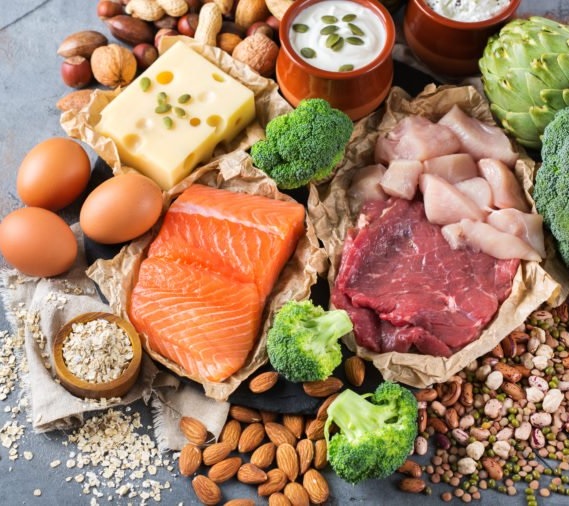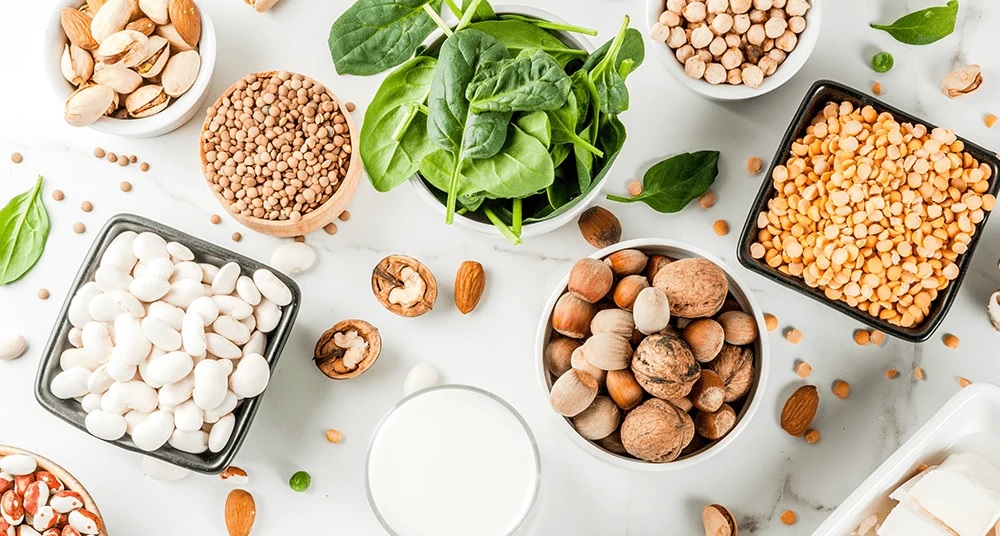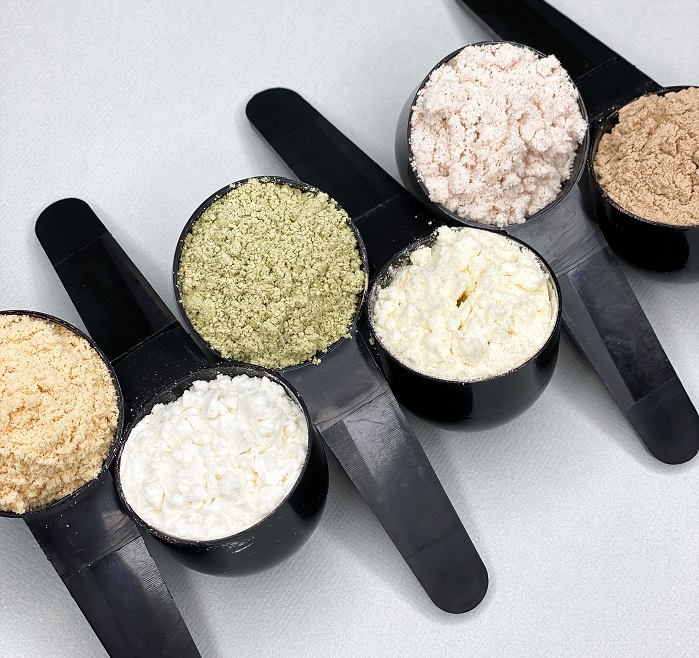
What is Protein?
Protein is one of the three essential macronutrients our body needs to function. The others being carbohydrates and fats.
Proteins are composed of various combinations of 20 different amino acids (AAs). Our body can create some of these amino acids, but not all of them.
There are 11 AAs our body can make by itself, which are deemed ‘‘non-essential’. The other 9 ‘essential’ AAs however, cannot be made by the body and must be obtained through food in the diet.
Eating a diet containing adequate protein keeps our body functioning at a baseline level for daily living.
The many different arrangements of AAs make up hundreds of proteins that all have specific uses in the body, including making hormones, enzymes, antibodies, and more.
One of proteins' major functions is to create structure in each individual cell; blood cells, organs and muscles. These are called structural proteins. Essentially, these act as the glue that holds a cell together so they can then A) give organs, tissue and muscles their shape, and B) allow the body to move.
Another major function of protein is to carry small molecules through microscopic barriers and into the centre of a cell, ready for transportation from one site to another. For example, ferritin is a transport protein which carries iron throughout the body. Iron holds oxygen, so without ferritin to transport iron, we would have no energy to move our muscles.
Some proteins can also assist with carrying out chemical reactions within cells, in the form of enzymes. For example, lactase is an enzyme made of protein that helps break down sugar found in milk (lactose). Those who are lactose-sensitive or intolerant have less lactase which makes that metabolism near impossible, leaving them unable to digest milk, hence the unfortunate and well-known side effects.
All cells and tissue contain protein, therefore it is essential for any growth or repair (general and/or purposeful, i.e. muscle building). In regards to physical recovery between sessions of athletic performance, protein plays a crucial role.
When a muscle is overloaded through training, it is damaged at the micro level of the muscle fibres. The damaged muscle initiates a repair process in which certain hormones and proteins synthesize new satellite cells, which are used to repair the damaged muscle fibers. In other words, protein helps to repair tissues damaged by exercise.
Protein can also be used as energy in the body, but the body prioritises fat and carbohydrates to be used as energy first, so that other protein related functions can be met. For example, if a very obese person were to stop eating completely, they would likely die of protein malnutrition before burning through all of their body fat.
Cells are constantly dying and being replaced in the body, so eating plenty of protein (in whatever form) is vital to support this process, no matter what. It is worth cautioning however, that extreme over consumption of protein may have counterproductive effects, resulting in gaining fat rather than muscle if consumption exceeds exercise.
How Much Do I Need?
While there are no hard set rules for exactly how much protein any given individual needs, we can make educated decisions based on some key factors that influence where on the spectrum of required intake you place.
Most people will be able to get enough protein for baseline health from food alone (provided, of course, they eat a wholefoods, balanced diet). However, depending on your daily energy expenditure, weight, diet and overall goals, your need may vary.
General guidelines:
For the average, healthy adult, who is mostly sedentary (not actively engaging in recreational sports or physical activity) the guideline for protein consumption is 0.8 grams of protein per kilogram of bodyweight. For an 80kg adult, this would be 64g protein per day. If boiled eggs were your only source of protein, this equates to 10 eggs every day.
For someone who does a lot of aerobic endurance training, they need higher intake to keep up with demand. The recommended daily intake for people in this group is between 1-1.6 grams per kilogram of bodyweight.
Lastly, for those who do a lot of strength training, consuming between 1.4-1.7 grams of protein per kilogram of bodyweight will be the optimal range for supporting muscle protein synthesis.
When considering what percentage of your total caloric intake protein should make up, we can also use the guideline of 15-30%, depending on activity levels as mentioned above, with the remaining calories coming from a split between carbohydrates and fats.
Foods that are high in protein are lean meats, eggs, fish, chicken or milk.

For vegans, sources include soy, beans, legumes, lentils, grains, nuts, and seeds.

Soy is the only form of plant-based protein that contains all nine essential amino acids. Otherwise, protein pairing is a smart way to be sure to get your essential amino acids through food. This is when you combine two foods, with specific AA profiles to create a food that is ‘complete’ (contains all essential AAs). For example, beans and rice are protein containing foods that alone, do not, but together, have all nine essential amino acids and therefore are a ‘complete’ protein pair.
Most people who engage in any type of exercise will need more protein than the usual ‘western diet’ alone can easily accommodate for, so opting for a protein powder is the most convenient, time efficient and versatile choice for getting in your quota. See our wide range of protein powders, products and recipe section for creative ways to increase your protein.
Is the More the Merrier?
Can I just eat more protein to gain more muscle? Unfortunately, no, this is not the case. There is a limit to how much protein your body can handle before it:
1. Is no longer useful
Your body is only capable of processing so much protein in a 24-hour window, so best to space out your total intake during the day.
Amino acids cannot be stored for future use and therefore are catabolised and excreted out of the body when taken in excess. There is no need to eat more than your calculated requirement, it will serve no benefit.
2. Becomes harmful to your body
Proteins have to be metabolised by your kidneys to break back down into their amino acids so they can be used by the body.
If you happen to have pre-existing kidney or liver issues, you should discuss your intake with your physician, as overconsuming protein can be harmful. This is due to the excess nitrogen found in the amino acids, along with waste products of protein metabolism taxing your already stressed kidneys. Otherwise, it is in fact beneficial.
When Should I Consume Protein to Get the Most Out of it?
Nutrient timing is a popular nutritional strategy that involves consuming nutrients, primarily protein and carbohydrates during and immediately following an exercise session.
This approach can produce dramatic improvements in body and muscle composition.
The timing of having protein is even more important than the total daily intake. In fact, the post-exercise period is widely considered the most critical part of nutrient timing.
Theoretically, consuming the proper ratio of nutrients during this time not only initiates the rebuilding of damaged muscle tissue and restoration of energy reserves, but it does so in a way which enhances both body composition and exercise performance.
The anabolic “window of opportunity” is approximately 30 minutes after training which protein and carbohydrates adapt and optimise muscles.

In Summary
Protein is essential for a wide array of vital functions, not least of which muscle and tissue repair following exercise.
How much daily protein you should need varies largely based on your weight and activity level.
Consuming excessive amounts of protein beyond the recommended amount will not equate to more muscle growth.
Get protein from lean meats and a variety of vegetables.
Protein supplements are a good way to support your intake.
